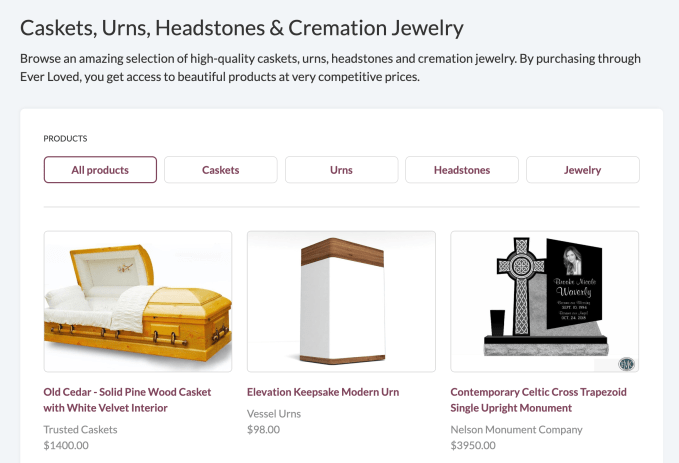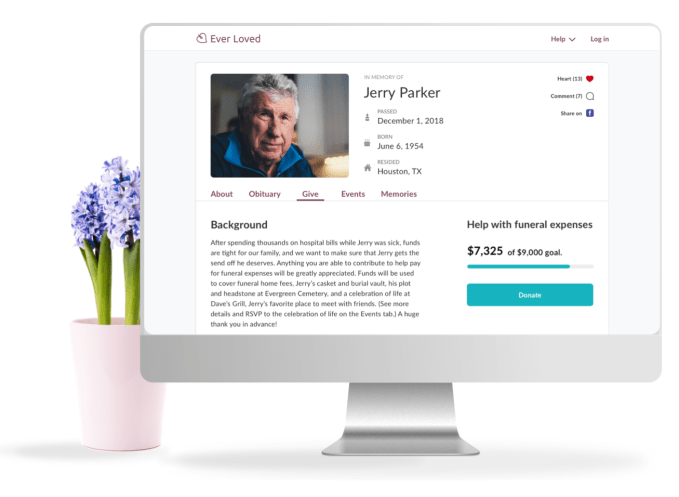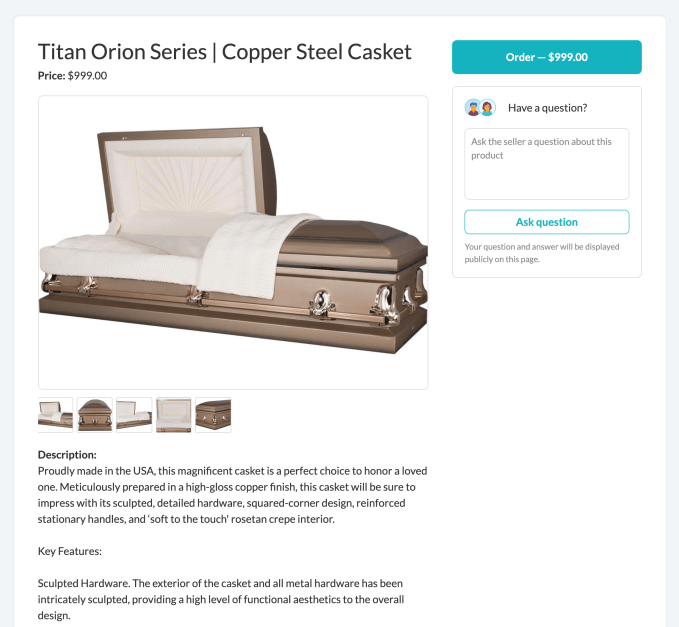The new app is called watchGPT and as I tipped off already, it gives you access to ChatGPT from your Apple Watch. Now the $10,000 question (or more accurately the $3.99 question, as that is the one-time cost of the app) is why having ChatGPT on your wrist is remotely necessary, so let’s dive into what exactly the app can do.
NEWS
Ever Loved’s funeral marketplace undercuts undertakers

Fifty percent of families are scared they can’t cover the cost of a funeral. They end up overpaying because no one wants to comparison shop amidst a tragedy. That’s why ex-Googler Alison Johnston’s startup Ever Loved built a free funeral crowdfunding tool. Now it’s addressing one of the most expensive parts of saying goodbye: burial. Today Ever Loved launches its online marketplace for caskets, urns, headstones and memorial jewelry.
By sidestepping the overhead of a physical funeral home, Ever Loved can offer better prices while still earning a 10% margin. Its caskets cost 50% less than the average sold at a mortuary, according to the National Funeral Directors Association.
When I called a local San Francisco funeral home, the high markups came into focus. They quoted me $2,795 for a casket sold for $1,200 on Ever Loved.

“Most people don’t think to — or don’t want to — plan funerals in advance, which means that when someone passes away, the family is often scrambling,” Johnston tells me. “When this rush to make decisions is paired with extreme grief, many people don’t do anywhere close to the same amount of research as they would with another several-thousand-dollar purchase. When combined with the fact that most funeral homes don’t publish their prices online, it’s easy for families to spend much more than they need to.”
Johnston co-founded Ever Loved in late 2017 after a family member was diagnosed with terminal cancer. She discovered how few resources there were available for helping people plan and pay for funerals. She’d previously worked at Q&A app Aardvark through its acquisition by Google, then started online tutoring startup InstaEDU that eventually sold to Chegg. The consumer website building and e-commerce tools she’d grown used to weren’t available in the funeral industry, so she set out to build them. Ever Loved has raised seed funding from Social Capital and gone through Y Combinator.

Ever Loved co-founder and CEO Alison Johnston
“Tech too often merely makes life and work easier for those who already have it good,” she told me last year. “Tech that tempers tragedy is a welcome evolution for Silicon Valley.”
Ever Loved’s first focus was its funeral crowdfunding tool that let families ask the decedent’s loved ones to help contribute to offset the costs. Donors could leave a tip for Ever Loved, but otherwise it charged nothing beyond credit card processing fees. The tool was paired with a memorial website builder that families could use for distributing invites and collecting memories. Now Ever Loved is helping people plan thousands of funerals per month with revenue up nearly 20X year-over-year.
Now that it’s helping families raise money for remembrance services, Ever Loved wants to make sure they don’t get ripped off. The fact that there’s such low pricing transparency at funeral homes should clue you in that they try to pass off steep markups since customers might not have the energy to keep looking. “The average funeral home only helps with a funeral once every three days, meaning that many funeral homes need to charge high prices in order to cover their own fixed costs,” Johnston explains.
Remove the overhead costs and assist customers across geographies and there’s room for a strong business with more affordable prices. For example, a Stanford Blue Casket costs $990 on Ever Loved while one LA funeral home charges $1,600. The Last Supper Pieta Casket is $1,500 on Ever Loved but $6,580 from the funeral home. That funeral home had both of these listed under different names, further hindering the ability of customers to find a fair price.

Ever Loved can also more quickly adapt to the diversification of burial options. Between concerns about costs, land use, environmental impact and connection to family and nature, many are looking beyond caskets. Cremation became more popular than burial in the U.S. in 2017. Liquid cremation is now legal in 18 states, and Washington just began allowing body composting.
“We’re seeing a lot of independent providers popping up to do everything from turning your loved one’s ashes into a diamond ring to shooting their ashes into space to planting them under a tree in the forest,” says Johnston. Any single funeral home is unlikely to offer the breadth customers are looking for. “Our goal is to make all of your options available to you in an easily digestible format.”
Ever Loved’s business is protected by the FTC’s Funeral Rule that bars mortuaries from refusing or charging extra to handle a casket or urn purchased elsewhere. That means Ever Loved customers can combine shopping online with in-person memorial services from a local funeral home. Still, it’s a tough business. Startups like HaloLife, Clarity and After I Go have all shut down. Most others merely offer memorial sites, or funeral home search engines.

That means Ever Loved’s biggest competitors, beyond the standard just accepting the local mortuary’s prices, are Google and Amazon. Often they surface the same prices as Ever Loved with comparable shipping, though Google could sometimes find a slight discount by buying straight from the manufacturer, while Amazon was missing some top brands. Costco and Walmart sell funeral products too. But Johnston says “many people don’t feel like generic, mass-market stores are the appropriate place to purchase funeral products.” I agree it might feel disrespectful buying an urn from the same place you get toilet paper.
“We also put a huge focus on customer service, which you don’t get at Walmart, Costco or Amazon,” Johnston tells me. “When you’re grieving and spending thousands of dollars, we’ve found that this is very important.”
As the demographic planning funerals gets more tech-savvy over time and want personalized farewells rather than cookie-cutter conclusions, there’s a chance to change the status quo. Discussing death is becoming less taboo. Being smart about paying for it should too.
Facebook Faces Yet Another Outage: Platform Encounters Technical Issues Again

Uppdated: It seems that today’s issues with Facebook haven’t affected as many users as the last time. A smaller group of people appears to be impacted this time around, which is a relief compared to the larger incident before. Nevertheless, it’s still frustrating for those affected, and hopefully, the issues will be resolved soon by the Facebook team.
Facebook had another problem today (March 20, 2024). According to Downdetector, a website that shows when other websites are not working, many people had trouble using Facebook.
This isn’t the first time Facebook has had issues. Just a little while ago, there was another problem that stopped people from using the site. Today, when people tried to use Facebook, it didn’t work like it should. People couldn’t see their friends’ posts, and sometimes the website wouldn’t even load.
Downdetector, which watches out for problems on websites, showed that lots of people were having trouble with Facebook. People from all over the world said they couldn’t use the site, and they were not happy about it.
When websites like Facebook have problems, it affects a lot of people. It’s not just about not being able to see posts or chat with friends. It can also impact businesses that use Facebook to reach customers.
Since Facebook owns Messenger and Instagram, the problems with Facebook also meant that people had trouble using these apps. It made the situation even more frustrating for many users, who rely on these apps to stay connected with others.
During this recent problem, one thing is obvious: the internet is always changing, and even big websites like Facebook can have problems. While people wait for Facebook to fix the issue, it shows us how easily things online can go wrong. It’s a good reminder that we should have backup plans for staying connected online, just in case something like this happens again.
NEWS
We asked ChatGPT what will be Google (GOOG) stock price for 2030

Investors who have invested in Alphabet Inc. (NASDAQ: GOOG) stock have reaped significant benefits from the company’s robust financial performance over the last five years. Google’s dominance in the online advertising market has been a key driver of the company’s consistent revenue growth and impressive profit margins.
In addition, Google has expanded its operations into related fields such as cloud computing and artificial intelligence. These areas show great promise as future growth drivers, making them increasingly attractive to investors. Notably, Alphabet’s stock price has been rising due to investor interest in the company’s recent initiatives in the fast-developing field of artificial intelligence (AI), adding generative AI features to Gmail and Google Docs.
However, when it comes to predicting the future pricing of a corporation like Google, there are many factors to consider. With this in mind, Finbold turned to the artificial intelligence tool ChatGPT to suggest a likely pricing range for GOOG stock by 2030. Although the tool was unable to give a definitive price range, it did note the following:
“Over the long term, Google has a track record of strong financial performance and has shown an ability to adapt to changing market conditions. As such, it’s reasonable to expect that Google’s stock price may continue to appreciate over time.”
GOOG stock price prediction
While attempting to estimate the price range of future transactions, it is essential to consider a variety of measures in addition to the AI chat tool, which includes deep learning algorithms and stock market experts.
Finbold collected forecasts provided by CoinPriceForecast, a finance prediction tool that utilizes machine self-learning technology, to anticipate Google stock price by the end of 2030 to compare with ChatGPT’s projection.
According to the most recent long-term estimate, which Finbold obtained on March 20, the price of Google will rise beyond $200 in 2030 and touch $247 by the end of the year, which would indicate a 141% gain from today to the end of the year.
Google has been assigned a recommendation of ‘strong buy’ by the majority of analysts working on Wall Street for a more near-term time frame. Significantly, 36 analysts of the 48 have recommended a “strong buy,” while seven people have advocated a “buy.” The remaining five analysts had given a ‘hold’ rating.

The average price projection for Alphabet stock over the last three months has been $125.32; this objective represents a 22.31% upside from its current price. It’s interesting to note that the maximum price forecast for the next year is $160, representing a gain of 56.16% from the stock’s current price of $102.46.
While the outlook for Google stock may be positive, it’s important to keep in mind that some potential challenges and risks could impact its performance, including competition from ChatGPT itself, which could affect Google’s price.
Disclaimer: The content on this site should not be considered investment advice. Investing is speculative. When investing, your capital is at risk.
NEWS
This Apple Watch app brings ChatGPT to your wrist — here’s why you want it

ChatGPT feels like it is everywhere at the moment; the AI-powered tool is rapidly starting to feel like internet connected home devices where you are left wondering if your flower pot really needed Bluetooth. However, after hearing about a new Apple Watch app that brings ChatGPT to your favorite wrist computer, I’m actually convinced this one is worth checking out.
-

 MARKETING7 days ago
MARKETING7 days agoRoundel Media Studio: What to Expect From Target’s New Self-Service Platform
-

 SEO6 days ago
SEO6 days agoGoogle Limits News Links In California Over Proposed ‘Link Tax’ Law
-
SEARCHENGINES6 days ago
Daily Search Forum Recap: April 12, 2024
-

 SEARCHENGINES5 days ago
SEARCHENGINES5 days agoGoogle Core Update Volatility, Helpful Content Update Gone, Dangerous Google Search Results & Google Ads Confusion
-

 SEO5 days ago
SEO5 days ago10 Paid Search & PPC Planning Best Practices
-

 SEO7 days ago
SEO7 days agoGoogle Unplugs “Notes on Search” Experiment
-

 MARKETING6 days ago
MARKETING6 days ago2 Ways to Take Back the Power in Your Business: Part 2
-

 MARKETING4 days ago
MARKETING4 days ago5 Psychological Tactics to Write Better Emails












